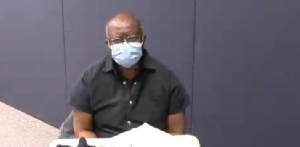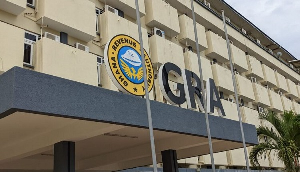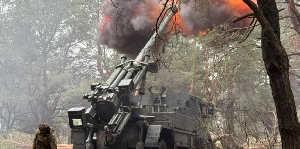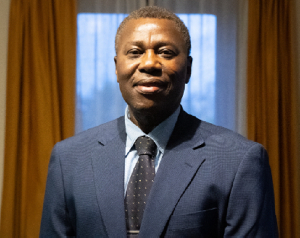William Antwi has chosen to follow that beat-up, discredited road of the opposition propaganda wagon that Nana Addo Dankwa Akufo-Addo, the 2008 NPP Presidential Candidate has some questions to answer on illicit drugs. His view is “Now that Nana Akuffo Addo has broken his silence on the drug menace undermining the stability of our still emerging democracy, can he please, in the name of God ‘honestly, frankly, competently and robustly’ address the following pertinent issues which issues seriously call into question his integrity and judgment as a public servant?”
When Mr Antwi said Nana had “broken his silence” he was in fact referring to the fact that Nana Akufo-Addo is so far the only candidate who has laid out a policy on how to combat drugs and violence crime. Nana has before the Busia Memorial Lectures on July 14, of course, like the other flagbearers, spoken several times against the drug menace, even recently on BBC World Service. At the Busia Memorial Lectures, Nana said, “I am determined to tackle the drugs problem. But the fight is not just for the Government or law enforcement agents. It is for mothers, fathers, siblings, teachers, pastors, imams, chiefs, community groups, and Ghanaians who care about the future of our society. The problem does not simply go away by politicians adopting a pre-occupational attitude of merely, constantly telling the general public that Ghana has a drug smuggling problem. We owe it to our children’s future to come up with truly imaginative solutions.”
Ghanaians are still waiting for the NDC, which has made ‘Drug’ a major propaganda issue to tell us how they intend to rid the country of the menace. But, let us limit ourselves to answering the three questions posed by Mr Antwi and widely circulated through the worldwideweb, courtesy of the popular www.ghanaweb.com. I shall take each of the three questions in turn and offer a response.
Q1. Why didn't [Akufo-Addo], as the then Attorney General, prosecute those three Djorwulu [sic] women who were arrested in February 2002 for trafficking in illicit drugs?
A1: As I speak, Mr Antwi, no docket has been forwarded to the A-G by the police for prosecution. It has not been unusual in Ghana for police investigation to take up to 12 months before coming to the Attorney-General. It is only when there is a particular public interest or uproar that the A-G will step in to ask the police to speed up or brief the A-G on progress. Thus, it is only after the police have forwarded a docket to the A-G Dept that prosecution can begin. For the two years that Akufo-Addo was the Attorney-General no such docket came to his attention. Your question, I believe, must be better addressed to the Narcotics Control Board (NACOB), the Police Serivce and the sector Ministry - Interior. It was for this reason that when the matter re-surfaced early last year, it was the then Deputy Minister of Interior, Nkrabeah Effah-Darteh, who was questioned by journalists. Also, until Gen Hamidu, the convention had always been that the Deputy Minister of Interior chaired NACOB.
Akufo-Addo intends to change all this. He wants to turn NACOB into an agency like America’s DEA (Drug Enforcement Agency), to clarify roles, especially the agency’s overarching role in combating drugs. Nana also intends to create a Drug Czar of cabinet status. Thus, in the future, Mr Antwi will be certain where the bucks stop in case other Dzorwulu women allegedly escape prosecution for drug offences.
Q2: Is it true that [Nana Akufo-Addo] caused to be deconfiscated the assets of his brother-in-law, Mr. Raymond Amankwah, which assets were proceeds from illicit drug activities?
A2: Raymond was convicted in the UK, the UK asked the NDC govt to confiscate his assets. The govt for some reason chose to add a Milk Factory on Spintex Road, which had clearly stated shareholders, on the thinking that Raymond was also a shareholder. But, instead of identifying what they saw as Raymond's share they confiscated the entire company. The shareholders appealed under the NDC. The case was pending when Akufo-Addo became A-G. The company won against the state. Nana Akufo-Addo as A-G appealed against the de-confiscation of the assets. YES! He appealed against the decision of the court. The case was pending when he was moved to the Foreign Ministry. His successor chose to discontinue the case, reasoning that the state indeed had no business confiscating that company among Raymond's confiscated assets.
Q3:Why did he stop the prosecution of Frank Benneh, an alleged drug dealer?
A3: I wish you didn't add this case to it. Frank Benneh is a an ex-diplomat who accused the Rawlings govt of smuggling drugs, when he was arrested in Switzerland and the NDC ensured that he was transferred to Ghana. He was convicted and released on bail on the same day under the NDC. Now ask yourself why. A US paper published then that this was just one of the many evidence that the NDC officially sanctioned drug trafficking. The Chronicle and Free Press culled that story. That was what led to Criminal Libel cases hanging on the heads of Kofi Coomson and Eben Quarcoo. Akufo-Addo as A-G, entered nolles prosiqui to have the cases struck out. Case closed!
In February 1995, the National Democratic Congress (NDC) filed two suits at a High Court in Accra, claiming damages for libel against the editors and publishers of two private newspapers. Those sued jointly and severally were Eben Quarcoo, Editor of the Free Press and Tommy Thompson Books Limited, publishers of the Free Press on one hand and Nana Kofi Coomson, Editor of the Ghanaian Chronicle and General Portfolio Limited, publishers of the Ghanaian Chronicle. At that time Huudu Yahaya, General Secretary of the NDC at a press briefing at the party headquarters in Accra. Mr Yahaya said “there is absolutely no link at all between Frank Benneh, a Ghanaian diplomat on trial in the country for his alleged involvement in drug deals and the NDC.” He stressed, “We wish to state emphatically that Mr Frank Benneh is neither a member of the NDC nor has anything to do for and on behalf of the party.” Mr Albert Bosomtwi-Sam, senior partner of Bosomtwi Sam and Associates, solicitors for the NDC, observed at the time that the said publications were not only false but also calculated to injure the party, lower its immense esteem in the eyes of the public and destroy its reputation as the leading political force in the country.
It would be recalled that the Free Press Wednesday January 31-Tuesday February 6 edition, carried a story on the front page headlined, "RAWLINGS, NDC IN BIG COCAINE DEAL". Also, the Ghanaian Chronicle, in its February 8-11 1996 issue published a story headlined "EXPOSED -- AT LAST". Both stories sought to link the NDC in acts of drug trafficking allegedly carried out by Mr Frank Benneh, a Ghanaian diplomat based in Geneva, Switzerland, and which was published by the African Observer, a US-based weekly.
Is it not ironic that today, the NDC has twisted this same case and rather accusing the NPP and its Presidential Candidate of conniving with Frank Benneh. Again in 1996, when a consignment of hard drugs (valued at 60 million pound sterling at the time) left through these shores to the United Kingdom, where it was finally apprehended, Kwesi Pratt Jnr went to Chelmsford Crown Court to give evidence to the effect that the NDC government was somewhat implicated in drug trafficking. NDC Press Secretary at the time, Vincent Asiseh, issued a statement in the Daily Graphic accusing the opposition of rather involving in drugs. Such is the nature of the NDC that when they are in power it is the opposition peddling in drugs and when they are in opposition it is the government.
The Ghana Embassy in Berne was allegedly turned into a drug haven in the era of the NDC in government. When Frank Benneh, the second in command at the embassy was busted, he began singing like a bird. The Government of Ghana under moral crusader Jerry John Rawlings negotiated with the Swiss Government and brought Benneh down to Accra, ostensibly for trial.
For emphasis, I reproduce here Nana Akufo-Addo’s statement on the drugs situation in Ghana and how he intends to deal with it.
Combating the Illicit Drug Trade
Chairperson, drugs are undermining the very fabric of our society. They are destroying our young people, misleading many about easy and fast money while sullying our reputation in the international community. This problem has been with us for a long time. They are not an NPP problem. They are not an NDC problem. They are a national problem. In fact, the scourge of narcotic drugs is a multi-billion dollar global problem.
Over the past two decades, the impact of the world-wide drug menace has been a source of grave concern for all law-abiding citizens of this country. The nation has been sorely embarrassed by disclosures that have implicated a number of high level state officials in the illicit drug trade. Undoubtedly, narcotics drug trafficking and the menace associated with it are strongly enabled by corrupt and inept systems of prevention and control. An Akufo-Addo Government will firmly and courageously implement a number of well-considered measures to embolden the capacity of the nation to effectively combat the drug menace.
The key highlights of the policy will include:
· Review of relevant laws with a view to enhancing their capacity to deter public officials from engaging in narcotic offences
§ Turning the Narcotics Control Board into an agency, to give it an overarching responsibility, across departments and agencies, in all cases to deal with drugs
§ Creating the position of a ‘Drug Czar’, by elevating the position of the head of NACOB to Cabinet status.
We don’t produce cocaine in Africa and yet West Africa has seen the biggest growth in illegal drug movements than anywhere else in the world. Geography favours the drug traffickers. Ghana’s geography does not favour us. West Africa is just 4,000-miles away, across the Atlantic, from the coca fields of South America. It is also closer to Western Europe. In Europe cocaine seizures have quadrupled over the past decade and prices for the drug are now double those in America as consumption has grown by up to four fold. Compared to 1.8 percent 10 years ago, Spain, where much of the cocaine through West Africa is destined, 3 percent of the Spanish population now uses cocaine. The demand has made Europe a far more lucrative drug market than America: apparently one kilogramme of uncut cocaine can fetch twice in Europe, what it can in the US, according to UN figures. Intelligence reports say to elude European airport security and coastal patrols more easily, smugglers ship drugs in bulk to Africa's western seaboard, where they are parceled out to hundreds of individual smugglers who use fishing vessels, sailboats and their own bodies to sneak it north into Europe.
Why is Africa, particularly West Africa growing in importance as a transit area for cocaine trafficking between Latin American countries and Europe? Records show that between 1998 and 2003, the annual cocaine seizures on the entire continent averaged about 0.6 metric tonnes – a very minor proportion of global seizures of cocaine. However, since 2004, African seizures have been above 2.5 metric tonnes, almost five times more than before. The UN's Office on Drugs and Crime says the world's total supply of cocaine is around 1 million kilogrammes a year. Interpol says 200,000 to 300,000 kilogrammes of the drug enters Europe via West Africa. The United States Bureau for International Narcotics and Law Enforcement Affairs (INL) at the Department of State compiles an annual ‘Major List’ of countries considered to be posing the biggest global threat in the drug trade. On September 14, 2007, U.S. President George Bush approved and sent to Congress the Majors List for 2008. The 20 countries on the list were: Afghanistan, The Bahamas, Bolivia, Brazil, Burma, Colombia, Dominican Republic, Ecuador, Guatemala, Haiti, India, Jamaica, Laos, Mexico, Nigeria, Pakistan, Panama, Paraguay, Peru, and Venezuela. Ghana is nowhere on that list. But, we need to do a lot more. We cannot afford to be complacent.
The New Patriotic Party believes that a robust comprehensive drug control policy can achieve measurable progress in curbing the supply and abuse of drugs and blocking the trafficking of drugs through our shores to consuming nations. Evidence from elsewhere and from our own experience tells that illicit drug trade corrodes social order; bolsters crime and corruption; undermines effective governance; facilitates the illicit transfer of weapons; and compromises national security and law enforcement. The legal framework provided by the Narcotic Drugs Control Enforcement and Sanctions Law 1990, PNDCL 236, as amended, and other legislation provides some of the tools needed to crack down on the availability of drugs and reduce the misery they cause. But enforcement alone will never be enough. We need to ensure that young people have all the information they need to make informed decisions about drugs – which means resisting peer-pressure and the lure of fast cars associated with the illicit drug trade and that we follow up tough words with indiscriminate decisive action. To make drug smuggling a no-go area as a career option for our young ones calls for partnership between citizens and law enforcement officers. A Focus on Young People
Crucial to our fight against drugs is the development and implementation of programmes that prevent illicit drug use, offer no refuge for drug pushers in our neighborhoods and provide a safe and secure environment for every Ghanaian in every corner of our land. We do so by reclaiming every inch of space from criminal gangs. Linked to our fight against drug abuse must be a comprehensive preventive measure aimed at protecting our children from a life of crime.
· Ghanaian families have a difficult but necessary task to teach young people to avoid using drugs. What is required is a structured anti-drug education policy for our schools.
· We must be bold but sensitive in confronting young offenders with the negative effects of their behaviour on their victims in novel and compelling ways.
· We must provide purposeful and engaging activities for the youth, especially those in real or potential conflict with the law.
· We must continue to increase access to education from pre-school to the tertiary level
· We must expand childcare facilities in urban and rural areas · Education on the dangers of illicit drugs is key. There should be an increased awareness of the dangers of drugs. A more proactive parental involvement, education, and community action are key to protecting our youth from the menace of illicit drug – as users, couriers or pushers.
· Evidence elsewhere has shown that we can use the power of media to make the use of drugs a very, very unattractive option for our young people. My government will invest in a long-term media campaign aimed at increasing perceptions of the harm of drug use and of social disapproval.
We must secure the future of our children by:-
· Building stronger neighbourhoods
· building stronger families as bulwarks against juvenile delinquency and criminality
· improving parental competence and teaching self-control and street smarts
· helping young people resist drug misuse in order to achieve their full potential in society
· reducing the harm caused by drugs in the community
· protecting our communities from related violent crimes, such as aggravated street mugging
· improving the quality of life
· implementing specialized social welfare programmes to address problems of youth alienation and despondency, and to assist youths to withstand peer pressures to experiment with drugs
· implementing a youth-oriented education campaign to assist youth in resisting the temptations presented to them by the criminal underworld, particularly in armed robbery, drug-trafficking, prostitution
· enhancing police-community relations and promoting community policing
· dismantling the criminal gangs that traffic in drugs Securing our borders
Drug trafficking is linked to cross-border violence and money laundering. We make meaningful headway against drug trafficking only by treating it not as a merely Ghanaian problem. Through partnership with other sovereign nations in our region and beyond, we can combat all of these serious threats to border security. West Africa is drawing up a plan to fight drug trafficking, in particular of Latin American cocaine and Asian heroin being smuggled to lucrative markets in Europe. Going forward, we must have a transnational strategy that aggressively polices our seas to ensure increased disruption of cocaine flow and continued disruption of trafficker means, methods and modes. We shall focus on a strategic review of international drugs activity - with a clear overall commitment of all the law enforcement, intelligence and diplomatic agencies in the West African region, especially, to reduce the flow of illicit drugs, to and through our shores.
Expanding the level of cooperation with partner nations across the transit zone will deny traffickers the freedom of movement they enjoy within the territorial waters of nations, such as ours, that are struggling with the means to interdict them.
Abdullahi Shehu, Director-General of the Inter-Governmental Action Group Against Money Laundering and Terrorist Financing (GIABA) in West Africa, who heads West Africa's programme against money laundering, received an additional mandate in August 2007 from the Economic Community of West African States (ECOWAS) to fight drugs cartels. We need to continue on this regional front. We shall also explore, with our neighbours, the possibility of a joint ECOWAS coastguard unit, involving our respective naval units.
‘DRUG CZAR’
I believe the creation of an overall Drug Czar, with the requisite powers, will go a long way in our fight against illicit drugs. With this, I am proposing an equivalent of the White House Office of National Drug Control Policy, a Cabinet level component of the Executive Office of the Presidency, to be established by law and headed by a Drug Czar. The Drug Czar, with enhanced powers, will also combine the powers of the Chairman and the Executive Director of NACOB under a new reformed structure. My government will re-designate NACOB as an Agency, which will give the new body a greater overall mandate over and control of the drug situation, and harmonise its collaboration with other law enforcement agencies and Ministries. An Akufo-Addo presidency will also pay special attention to the classification of narcotic drugs and review the penalties for drug-related offences, with particular attention to increasing the prison terms of those convicted for the supply or possession of drugs with intent to supply. The object would be to ensure that Ghana becomes “a no-go country” for drug dealers, both domestic and international. We aim to tackle drug supply at every opportunity: internationally, nationally, regionally and locally, to focus on all points in the supply and demand chain. The fight against drugs should be part of a wider range of policies to regenerate our communities, expand access to education, skills training and jobs. The more we intensify our efforts in providing opportunities for all and in apprehending the criminals, the less attractive the illicit drug trade becomes.
I am determined to tackle the drugs problem. But the fight is not just for the Government or law enforcement agents. It is for mothers, fathers, siblings, teachers, pastors, imams, chiefs, community groups, and Ghanaians who cares about the future of our society. The problem does not simply go away by politicians adopting a pre-occupational attitude of merely, constantly telling the general public that Ghana has a drug smuggling problem. We owe it to our children’s future to come up with truly imaginative solutions. Drugs are a very serious problem in Ghana, in West Africa, in Africa, in Europe, in America, in Asia and everywhere – it is a global problem from which our geographical location has not been spared. No one has any illusions about that. Drugs are a threat to health, a threat to a productive future, a threat to our personal security, a threat to our communities, a national security threat. Let us approach it with the kind of responsibility Ghanaians demand of their political leaders.
In the end, it must be noted that security is not a commodity the state buys and the Police imposes on the populace. It is the result of the entire citizenry working together to respect the laws, to ensure social justice, to take care of the economically weak and vulnerable, and to support law enforcement agencies with credible information. Security comes about when citizens do the right thing in accordance with law. My vision for Ghana is to create a free, healthy, confident, educated and prosperous modern society. I believe we can do so and still avoid the side-effects of modernisation – the harm caused by growing misuse of drugs - that is common with western societies. Chairperson, I have discussed with you the soaring vision that Dr Busia had for our party and our country and how his time at the helm of our nation was all too brief.
We have discussed the important link between democracy, security and the rule of law, for the state, communities and individuals as they go about their lawful activities.
I have pledged to double the strength of our Police Force from 25,000 to 50,000. I have also committed to modernising the police force, with better training and resources, together with higher standards of accountability that will make the force, in the eyes of all, the friendly and professional protectors of the public. I have pledged to appropriate the necessary resources to strengthen the relevant institutions that will be in the vanguard of preventing and fighting crime. Today, I have challenged every citizen to take a stand in the fight against crime, indiscipline on our roads and drug trafficking and to see themselves as part of a “citizens army” working together to protect ourselves and make our country safe. As I have indicated, my presidency will increase educational opportunities for our young people, coupled with jobs that pay living wages when they are working to strengthen their families and to make crime and indiscipline unattractive to them. Together, let us strengthen one another, our families and our national family by protecting and believing in ourselves, our future and IN GHANA! In order to achieve in any human endeavour, YOU MUST FIRST BELIEVE! We may be five years short of celebrating Dr. Busia’s centenary; yet, we are long in celebrating the return of the hope he held so dear for Ghana. This year marks the 51st anniversary of our country’s independence. It also marks the 15th anniversary of the Fourth Republic. That we can say today that this fourth attempt at democracy for our Republic has been the longest enduring is in itself a remarkable achievement. The First Republic lasted six years. The Second Republic lasted two and a half years. The Third Republic lasted the same brief period. So what has been the secret to the success so far of the Fourth Republic? One can think of a combination of factors but what quickly comes to mind is a slogan that Ghanaians collectively were compelled to adopt in the 1990s and has since been the guiding and guarding principle for our society. That slogan, Chairperson, is: “NEVER AGAIN!”
Never again will Ghana go back to one-man rule, military dictatorship, state-sponsored human rights violations, wanton confiscation of assets, and criminalisation of entrepreneurship and a culture of torturing silence. Ghana is a country that is moving forward to its manifest destiny – a future of confident, educated, healthy and competitive people, free to create, optimise and benefit from economic opportunities in a society that operates on the principles of democratic accountability, rule of law, social justice and human rights. Dr. Busia dreamt of a nation at peace, prosperous and generous, a beacon of hope to Africa and the world, a proud African lion, striding into the future with confidence, secure in the knowledge that here on this continent, we are the nation of destiny, an example, not just for our age but for ages. Let us move forward!
Yenko yenim!
Won Ya Wor hie!
Kwabena Poku-Kyei
Opinions of Tuesday, 22 July 2008
Columnist: Poku-Kyei, Kwabena














